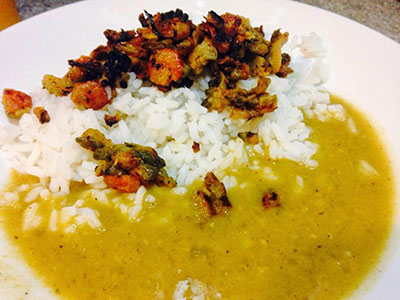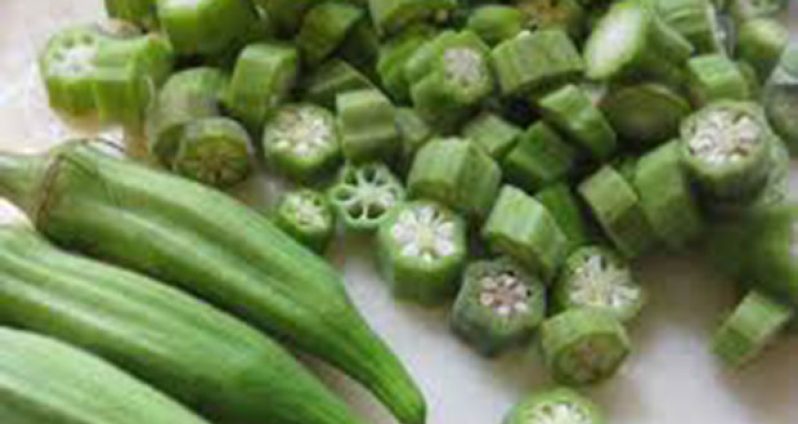Benefits of eating Okra (ochro) and our very own Guyanese vegetable corrila is good for killing cancer and stopping diabetes.

Benefits of eating Okra
The mucilaginous content in okra sets it apart from other vegetables for its extraordinary benefits.
Description
Okra is also known as “lady’s finger” in some parts of Asia and various other names in other parts of the world. The plant is cultivated in tropical, sub-tropical and warm temperate regions around the world.
Okra is an edible pea pod and although can be eaten raw, I’ve never acquired the raw taste. You can lightly blanch, steam or give it a quick stir-fry to reduce the “green” taste.
Use when it’s tender, as it gets very fibrous when it’s older. In the okra pods, the white soft seeds (edible) are arranged in 5 to 10 vertical columns, giving it the angled appearance on the outside.
Nutritional Benefits

Okra is very low in calories and dense with nutrients. It is high in fibre, vitamins A, C and folate content.
It is also a good source of the B vitamins, vitamin K, calcium, potassium, iron, zinc, and traces of magnesium and manganese.
Okra is one of those few vegetables which have the highest content of phytonutrients and antioxidants such as beta-carotene, xanthin and lutein.
Health Benefits
Okra is one of the best medicinal vegetable although it is not everyone’s favourite. You may like to try it if you knew about its immense health benefits:
Anaemia: Helps red blood cells production and prevent anaemia.
Anti-Cancer: The high antioxidants in okra helps protect the immune system against harmful free radicals and prevent mutation of cells.
Asthma: The high antioxidants and vitamin C content make okra useful for reducing asthmatic attacks.
Bone Strength: Folate in okra builds strong bones and density, preventing osteoporosis.
Cholesterol: The soluble fibre helps to lowerserum cholesterol, thus also reducing atherosclerosis and the risk of heart diseases.
Constipation: The rich fibre and mucilaginous (slimy) content in okra pods help increase bulk, bind to toxins and ensure easy bowel movements with its natural laxative properties. Regularly eating okra also reduces the risk of colon cancer.
Diabetes: It has insulin-like properties that help to reduce blood sugar level.
Gut flora: The fibre helps improve the population of beneficial bacteria in the gut.

Immune Booster: The high antioxidants and vitamin C content make okra a good immune booster food that reduces your chances of catching the cough and cold.
Peptic Ulcers: The mucilaginous content provides a temporary coating to the digestive tract and stomach lining while healing ulcers.
Pregnancy: The rich folate content in okra can help decrease the incidence of neural tube defects in babies.
Skin Health: With good bowel movements, skin health will improve. Helps reduce acne, psoriasis and other skin conditions.
Vision Health: Okra contains beta-carotenes (precursor of vitamin A), xanthin and lutein, all antioxidant properties that are helpful for vision health, preventing eye problems like cataract and glaucoma.
Consumption Tips
Choose smaller-sized okra over the big ones. The feel should be crisp and firm to be sure they are tender and not overly fibrous. Avoid those which color does not look fresh and are soft.
As with most vegetables, okra may be subject to insecticide/pesticides. Buy organic if possible. If not, soak okra in water with apple cider vinegar and seasalt for about 10 minutes, then rinse thoroughly.
Cut off the tops and cut okra into smaller pieces of 2-3 inches if desired. Lightly blanched, steamed or quickly stir-fried to reduce the mucilage and the “green taste”. It can be added into your salad, or dipped into your home-made chilli sauce, or eat it just on its own.
Okra cannot be juiced due to its very fibrous texture and mucilaginous (slimy) content.
Caution
Like most vegetables, okra has a small amount of oxalic acid and does not generally bother. Avoid okra if you have a history of kidney stones.
Why our very own Guyanese vegetable corrila is good for killing cancer and stopping diabetes.
According to Dr. Frank Shallenberger, when it comes to fighting cancer, he’s always looking for natural substances that interrupt the odd metabolism of cancer cells.
Some of his discoveries include resveratrol, green tea, Seanol, and others. Most recently, he found a fruit that was effective in killing pancreatic cancer cells. The fruit is called bitter melon (corrila) and is popular in Okinawa, Japan.
When bitter melon juice is diluted to 5% in water, it proved itself to be incredibly damaging to pancreatic cancer cell lines. According to researchers, bitter melon juice reduced the viability of two cancer cell lines by 90% and killed the remaining two lines at a rate of 98%.
So, great, these studies show that corrila juice worked in cancer cells in a dish. But do they work in animals? Will they work in people? Apparently yes. University of Colorado researchers administered bitter melon doses to mice and found a 64%reduction in pancreatic tumour size without any kind of side effect.
The dose was the same as six grammes of powder for the average sized human. Bitter melon may also help diabetics. Researchers found that bitter melon helps ameliorate metabolic problems by its effects on glucose metabolism.
Of course, if you have cancer or diabetes, talk with your doctor about rolling in bitter melon treatment with other treatments to have the highest rate of success against cancer.
Join us again for next week edition of the Pepperpot’s weekly Health Digest where we will be focusing on Ways to Boost and Support Your Immune System Naturally and Herbs that Lower Blood Pressure




.png)









